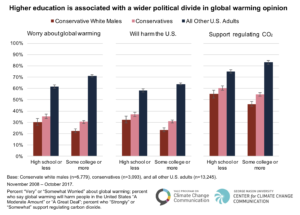Peer-Reviewed Article · Dec 30, 2019
Does socioeconomic status influence the political divide on climate change?
By Matthew Ballew, Adam R. Pearson, Matthew Goldberg, Seth Rosenthal and Anthony Leiserowitz
Filed under: Beliefs & Attitudes, Policy & Politics and Audiences

We are pleased to announce the publication of a new research article, “Does socioeconomic status moderate the political divide on climate change? The roles of education, income, and individualism” in the journal Global Environmental Change.
Climate change is a politically divisive issue in the U.S. Prior work has found that conservative white males in particular, more than other groups in the U.S., tend to be dismissive of climate change (i.e., the “conservative white male effect”). Other research suggests that socioeconomic status can increase the political divide on climate change: higher education and/or higher income are associated with tendencies to dismiss climate change among the political Right, and pro-climate views among the political Left.
This study investigates whether education or income has a stronger effect on the political divide in climate change opinion, and to what extent these factors influence the opinions of conservative white males. Across climate change beliefs, risk perceptions, and policy preferences, we found that higher education and higher income may increase differences in opinion between liberals and conservatives. However, education appears to have a stronger effect than income in the dismissive views of conservative white males: education is consistently associated with greater polarization between conservative white males and all other adults in the U.S. Conversely, for moderate and liberal adults, higher education, as well as income, is related to greater acceptance, concern about climate change, and policy support.
Some scholars theorize that higher education and income influence dismissive tendencies by orienting the political Right to partisan ideologies and reinforcing certain worldviews (e.g., individualism or valuing individual liberty, autonomy, and freedom from government intervention). We found support for these perspectives. Higher socioeconomic status may strengthen conservatives’ individualistic values, which, in part, may promote tendencies to dismiss climate change and resist climate policy. Again, for conservative white males, we found that education appears to play a stronger role than income in shaping individualism, and thus climate change opinion.
Although this study is correlational, making causal inferences difficult, it provides evidence of the roles of socioeconomic status and individualism in shaping the political divide on climate. Educational attainment, in particular, is associated with the climate views of the most dismissive political segments of the U.S. public. Other research has suggested that higher educational attainment supports motivated reasoning, making it easier for individuals to find, access, and even cherry-pick data and arguments that support their current opinions. Further, although public discourse tends to focus on conservatives’ dismissiveness regarding climate change, our research indicates that there is variation among conservatives. For instance, conservatives (even conservative white males) lower in socioeconomic status are more worried about global warming than their higher-SES counterparts.
The full article is available here to those with a subscription to Global Environmental Change. If you would like to request a copy, please send an email to climatechange@yale.edu, with the subject line: Request SES and the Political Divide Paper.
This project was supported by the Schmidt Family Foundation, the U.S. Energy Foundation, the Grantham Foundation, and the MacArthur Foundation.
